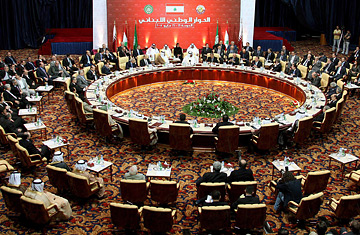
Rival Lebanese leaders at the Doha talks, have reached agreement on steps to end the crisis that has led to the worst violence since the 1975-1990 civil war.
The Lebanese are used to their leaders — sectarian warlords, corrupt tycoons and rebel clerics — creating more problems than solutions. So when almost all of the country's top men boarded planes on Friday for negotiations in Qatar to end the country's worst crisis since the end of the Lebanese civil war, there was joy in the land. "No one wants you; the population is living without you; your absence has made us comfortable," go the lyrics of The Leaders Left Lebanon, an instant hit song making the rounds on music television stations.
But then news reached Lebanon on Tuesday morning that the talks had produced an agreement that may end the country's 18-month-old political crisis. The Beirut stock market jumped, and opposition leaders announced they would dismantle their protest campground in downtown Beirut that has clogged traffic, destroyed local businesses, and become the tattered symbol of Lebanon's dysfunction. But the relief among war-weary Lebanese is unlikely to be echoed in Washington, Paris and Jerusalem, since the new arrangement is bound to reverse years of effort to blunt Hizballah's influence.
The Lebanese political crisis started in the aftermath of the 2006 war with Israel, when the Hizballah-led opposition accused the American-backed government of carrying out an American plan to disarm the militant anti-Israeli group. When the Lebanese government refused to back off and went further to accuse Hizballah of orchestrating a Syrian and Iranian-inspired coup attempt, opposition protests devolved into a series of street clashes, culminating earlier this month when Hizballah fighters decimated loyalist militias in Beirut. The speed and ease with which Hizballah overran the government's supporters, surrounded the homes of cabinet ministers and occupied offices belonging to the ruling parties gave the government little choice but to submit to Hizballah's demands.
The new agreement broadly gives Hizballah what it wants: legitimacy as an armed state-within-a-state. The opposition will now have enough ministers in the Lebanese cabinet to veto any major decisions, effectively ending any attempt to move against Hizballah's weapons. It also calls for parliament to elect a consensus candidate, army chief Gen. Michel Suleiman, to the country's presidency, which has been vacant for months. The government had been hoping to elect one of its own, since it controls a majority in parliament.
The current government could have continued to hold out against Hizballah and clung to office and symbolic support from the West. But in the absence of any real central authority, the country was already starting to unravel along sectarian lines. Lebanon's multi-religious character and political system — which divides power among the country's largest sects — is famously fragile. The sectarian feeling unleashed by clashes between Hizballah, a Shi'a Muslim party, and government supporters, who are mostly Sunni and Druze Muslims, threatened to push the country into another civil war.
The agreement doesn't mean Lebanon is out of the woods. For real stability to take root, the foreign countries fighting for regional supremacy in the cold war for the Middle East will have to stop using Lebanon as a battlefield. On the one hand, Syria could use Hizballah's political and military victory to work its way back into dominance over Lebanon, which Syria occupied until 2005. Hizballah's strengthened government role will help Syria get the new Lebanese government to scupper plans for a U.N. tribunal to investigate the assassinations of a series of anti-Syrian Lebanese politicians and journalists. Syria will also probably want to stop Lebanese attempts to tighten controls over their porous common borders, through which Syria probably sends Hizballah weapons.
The U.S. government may find a Hizballah-dominated Lebanon hard to swallow. Disarming Hizballah and securing Lebanon's independence from Syrian and Iranian influence was one of the Bush administration's major Middle East policies; it garnered broad support among European governments, including France, that were not on board in Iraq. Nor will Israel be keen to live with the fact that its most formidable adversary is now in de facto control of almost an entire country, with a sophisticated banking system, an international airport and a varied mountainous terrain in which to train and prepare for war. But Israel and America have few options. They can't isolate Lebanon like the Hamas-controlled Gaza strip, and the last two Israeli invasions of Lebanon were disasters. Like the American-backed government, they may have to admit defeat in Lebanon.
